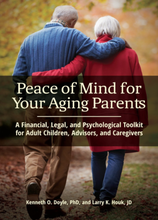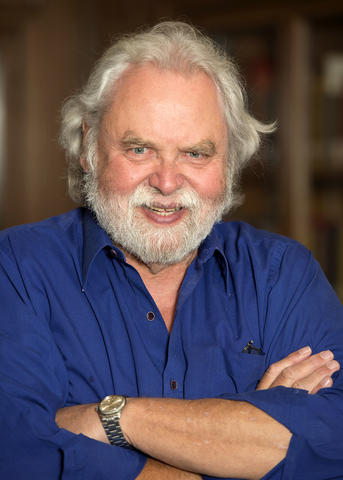Peace of Mind for Your Aging Parents is a financial, psychological and legal toolkit.
Associate Professor Kenneth Doyle, along with Larry Houk, JD, published Peace of Mind for Your Aging Parents: A Financial, Legal and Psychological Toolkit for Adult Children, Advisors and Caregivers. Below Doyle answers questions about why they wrote this book for this particular audience.
Why did you decide to write this book?
We both watched our parents worry more as they grew older. Some of the things they worried about you could control, through financial planning and estate planning, for instance. But many of their worries were about things they couldn’t control. For things they can control, we wrote about legal and financial stuff. For things they can’t control, we wrote about psychology and spirituality.
Why did you aim the book at adult children?
As people grow older, many of them become less interested in financial and legal matters, and less inclined to get involved. In lots of families, the parents turn to their adult children – “kids” maybe 40-60 – to help them deal with all the detail. We wanted to write a book that would help prepare families for more meaningful conversations among themselves and with their lawyers, financial planners, accountants, and other advisors.
Why all the emphasis on psychology?
We learned in our practices that both financial planning and estate planning depend a lot on psychology. Lawyers and financial planners often ask, “Why won’t my clients do what I say?” The answer is that clients will only do what fits their personalities. If it doesn’t fit, they won’t stick to it. So, through the whole book we talk about different solutions for different kinds of people. That’s psychology.
Second, the financial and legal worlds are full of symbolism. A will, for example, scares people because it reminds them of their mortality. A wheelchair or a walker talks about loss of freedom. We try to point out where the symbolic meanings of everyday things can affect the decisions people make.
Finally, we talk about how aging parents and their adult children see the world differently. Parents and children grew up in very different worlds. They often have different values, different ways of looking at the world, different hopes and fears. We talk about how the children can bridge the communication gap that many of us have with our parents.
What's the biggest issue you see with estate planning?
What’s especially interesting about estate planning is how little attention many people pay to it. Unless somebody’s seriously ill or about to fly across an ocean, the family simply doesn’t want to talk about it. Some people deny death – “You’re not going to die,” which obviously means “I don’t want to talk about losing you.” Other people deny owning anything of value – “I don’t have enough to worry about.” But in our experience, it’s the small estates that occasion the biggest conflicts. The less there is to divide, the more emotionally important each individual item becomes. Whatever the reason people give, the fact is that they often don’t have the conversations they need for an orderly and efficient transition.
Ben Franklin said, The only certain things are death and taxes. Estate planning deals specifically with the only two things in life that are certain.
What do you cover in the book when it comes to financial planning?
A popular tool for financial planners is the financial pyramid, a triangular graphic that says everybody should invest most of their money on the lower, safer levels of the pyramid, progressively less as one moves up the levels. We say it’s more realistic to admit that the Christmas-tree shape is right for some people. Those who don’t like risk should invest most of their money on the lower levels. But that makes them vulnerable to inflation risk. The shrinking value of the dollar especially hurts cautious investments. On the other hand, the Christmas tree shape is totally wrong for people who enjoy risk, and there are more of those people around than you might think. People who naturally like risk will want to invest more of their money on the higher levels. But this leaves them vulnerable to market risk. Truth be told, following your natural instincts isn’t best for either group. People who hate risk should invest a little more on the higher levels than they’re comfortable with, to combat inflation. People who love risk should invest a little more on the lower levels to protect against their investments going broke. Both types of people need a little nudge in the direction that’s opposite to their natural inclinations.
Earlier you talked about those worries aging parents can't control. Say more.
When faced with scary things you can’t control, the best thing is to turn to psychology or spirituality. For example, recently some really bright psychologists have been studying what makes people happy. Their answer is, find activities in which you can really lose yourself, whether it’s an art, a craft, a business, or a sport – something where the time just flies by. Then do that as much as you can, including doing a good dose of it on behalf of other people. That’s the secret to a happy, contented life.
Psychothearpist Joan Erikson, wife of the famous developmental psychologist Erik Erikson, proposed that a downside of very old age – she was in her 90’s when she wrote this – is that you feel like your senses have deadened. She prescribes ways to enliven each of the senses. For example, find music that really excites you and listen to it a lot, even if you have to use headphones to get the volume right. Expose yourself to the aroma of home cooking or favorite fragrances, to enliven the sense of smell. Find something that pleases each of the senses and expose yourself to it frequently.
Meditation and the other relaxation techniques can actually reduce blood pressure, relieve pain, and generally make people feel better. There are many different techniques but a popular one is to sit or lie down comfortably in a dark room and begin to take deep rhythmic breaths. Imagine a little cork floating on top of the column of air as it passes through your nostrils, through your bronchii, down into your lungs and back again. Simply concentrating on your rhythmic breathing once or twice a day for 10-20 minutes will leave you feeling remarkably refreshed.
What does all that have to do with law and financial planning?
There are problems you can control and problems you can’t control. Many of the problems you can control are financial and legal matters. But there are lots of problems you can’t control, including some financial and legal things. That’s when you can turn to psychology and spirituality to take the edge off them. These techniques can help you find peace of mind whether you’re bothered by things you can control – or can’t control.

